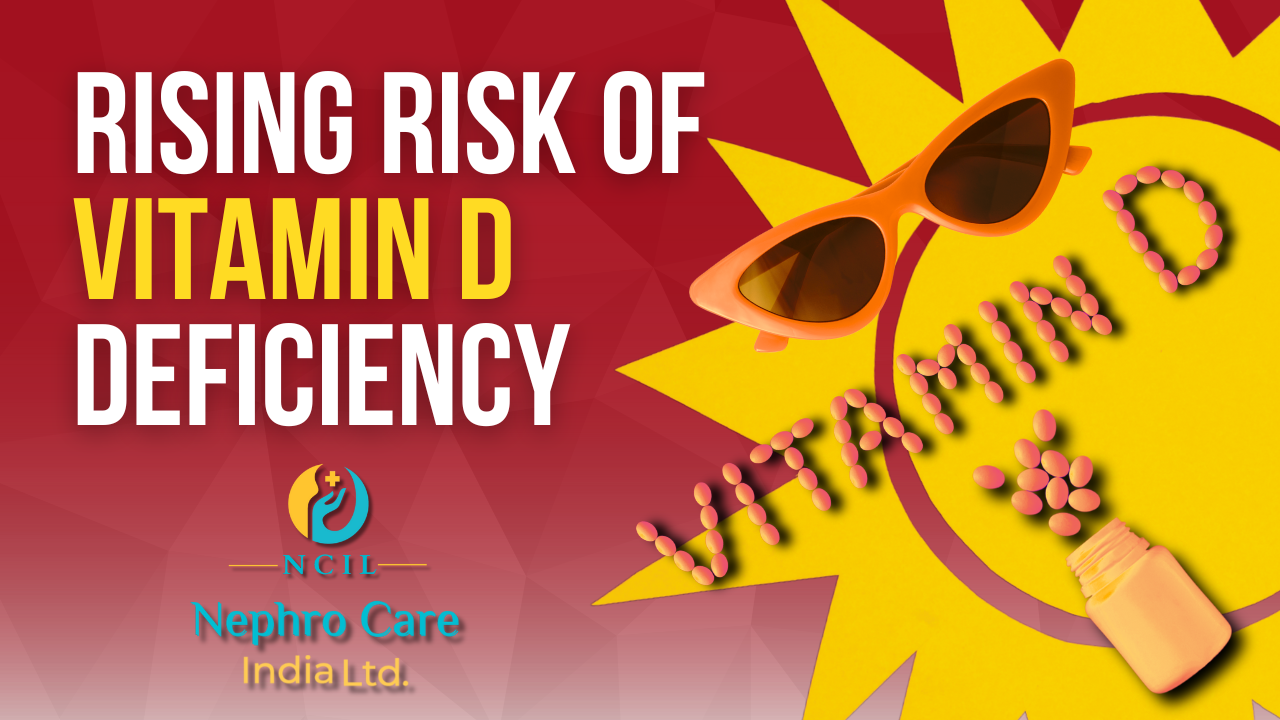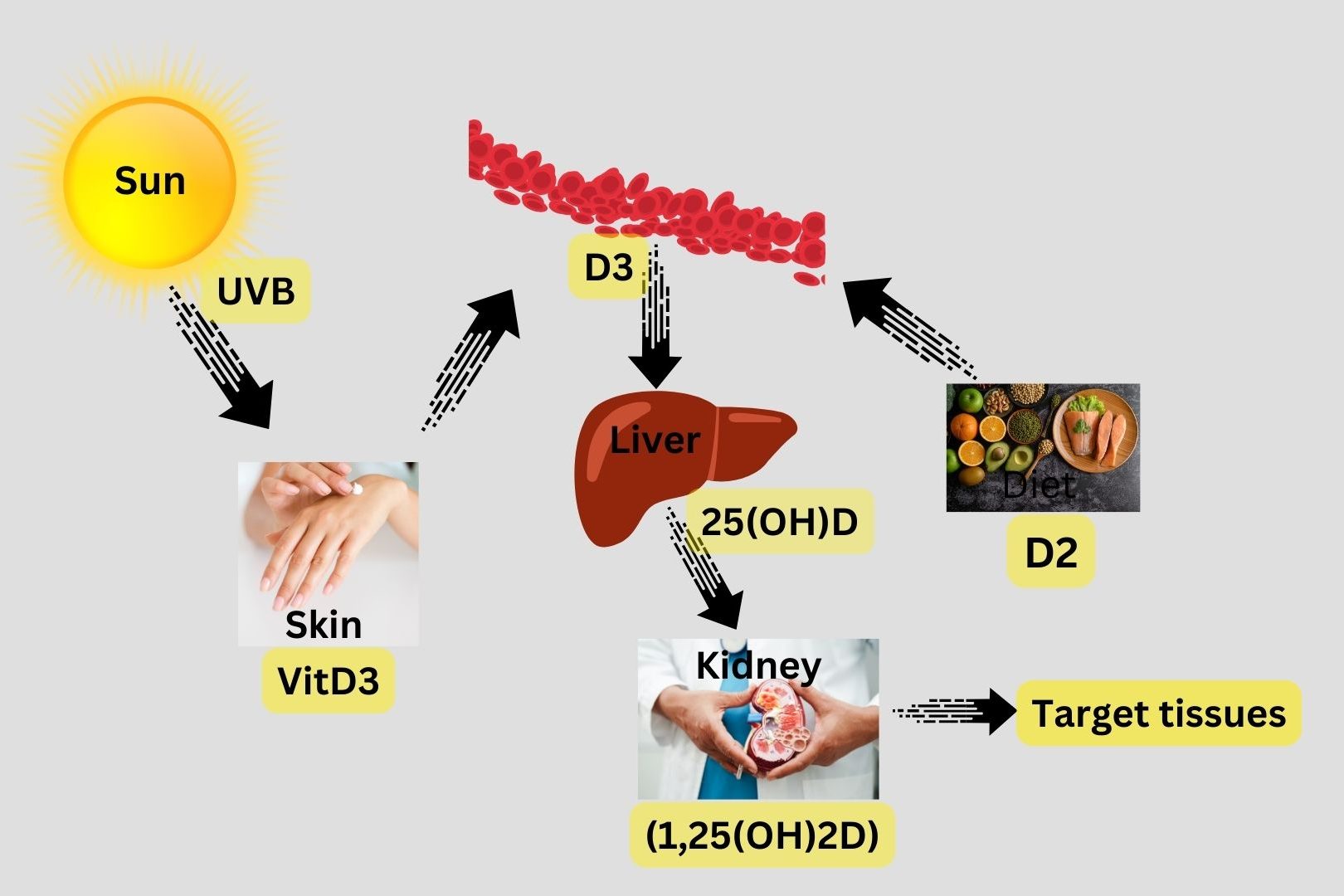
- 170
- 0
The rising risk of Vitamin D Deficiency
You might have heard of vitamin D being called the “sunshine vitamin,” because it is produced in the skin with exposure to sunlight.
With the rise of technology and more sedentary lifestyles, both children and middle-aged individuals are spending an increasing amount of time indoors. This shift has resulted in a notable increase in vitamin D deficiency. The decrease in outdoor activities and playtime has led to reduced sunlight exposure, which is essential for the body’s production of vitamin D. This vitamin is vital for maintaining good health, and its deficiency can cause various serious health issues over time. Please keep reading to understand its vital roles, recognize deficiency symptoms, and learn how to boost your intake.
Vitamin D
Vitamin D, a fat-soluble vitamin, is absorbed with dietary fats and stored in fatty tissues and the liver. It is primarily recognized for supporting bone, teeth, and muscle health by aiding the absorption of calcium, magnesium, and phosphate. Additionally, vitamin D is crucial for various bodily functions, including immune system support, cell growth, and blood pressure regulation.
Pathways of Vitamin D Activation:

- UVB Exposure
- Conversion in the Skin
- Liver Conversion
- Kidney Activation
Function of Vitamin D:
Cholecalciferol, also known as vitamin D3, serves various crucial functions in the human body.
- Improve bone Health
- Immune Function
- Cell Growth and Regulation
- Muscle Function
- Cardiovascular Health
Vitamin D deficiency:
Vitamin D deficiency happens when the body lacks sufficient levels of this vital nutrient, which is essential for bone health and immune system support. To prevent deficiency, ensure you get enough sunlight, vitamin D rich eat foods high and consider taking supplements if needed.
There are two main types of vitamers, Ergocalciferol (Vitamin D2) and Cholecalciferol (Vitamin D3), which are eventually converted into the active form of vitamin D in the body. Current scientific studies indicate that vitamin D3 is the preferable form, as it is more efficient at increasing the overall concentrations of vitamin D in the body.
Effects of Vitamin D deficiency:
- In relation to heart health, a deficiency in Vitamin D has been associated with an increased likelihood of self-reported coronary heart disease, heart failure, and peripheral vascular disease.
- Several cardiovascular risk factors coincide with lower levels of vitamin D, encompassing hypertension, diabetes, elevated body mass index (BMI exceeding 30), heightened triglyceride levels, and microalbuminuria.
- Vitamin D deficiency can significantly affect kidney health due to the kidneys’ vital role in converting vitamin D into its active form, necessary for regulating calcium and phosphate levels in the bloodstream.
- Bone Problems: Vitamin D deficiency can cause rickets (skeletal deformities) in children, osteomalacia (bone softening) in adults and osteoporosis (fractures and bone density loss) in older adults.
Symptoms:
A range of symptoms which can be a caused by low levels of vitaminD. These include:
- Fatigue
- Hair loss
- Low mood
- Muscle weakness
- Loss of appetite
- Pale skin
- Reduced immunity
- Lower quality sleep
- Bone pain
Who is at risk?
Vitamin D deficiency can affect a variety of groups, particularly those with limited sun exposure or certain health issues. Those at highest risk include:
- Indoor Workers: People who spend most of their time indoors, such as office employees and students, often do not get enough sunlight.
- People with Dark Skin: Those with higher melanin levels, like individuals of African, Caribbean, or South Asian descent, have reduced vitamin D production from sunlight.
- Older Adults: Aging reduces the skin’s ability to produce vitamin D, and older adults often spend more time indoors.
- Individuals with Certain Health Conditions: Diseases such as Crohn’s or celiac, which impair fat absorption, can lead to vitamin D deficiency.
- Obese Individuals: Excess body fat can store vitamin D, making it less available to the body.
- People with Dietary Restrictions: Since vitamin D is mainly found in animal products, vegans and vegetarians may not get enough of it.
To get more information about dietary advise, please join our whatsapp group:
- Pregnant and Breastfeeding Women: There is a higher demand for vitamin D during pregnancy and breastfeeding.
In summary, maintaining adequate levels of vitamin D is crucial for overall health. Often referred to as the “sunshine vitamin,” it plays vital roles in bone health, immune function, and cardiovascular well-being. However, modern lifestyles with reduced sun exposure have led to a rise in vitamin D deficiency among various demographics. Recognizing the symptoms of deficiency and understanding high-risk groups are essential for early intervention and prevention of associated health issues. Therefore, ensuring sufficient sunlight exposure, consuming vitamin D-rich foods, and considering supplements if necessary are key steps in maintaining optimal vitamin D levels and promoting good health.
Comment
Check Your EGFR
***We Promise, no spam!






